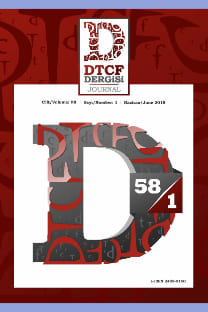ORTAÇAĞ HRİSTIYAN DÜNYASINDA BELLEK KAVRAMI VE GİZEM OYUNLARI: YORK DÖNGÜSÜ
THE CONCEPT OF MEMORY IN MEDIEVAL CHRISTIAN THOUGHT AND MYSTERY PLAYS: THE YORK CYCLE
___
- Aquinas, Thomas. “Commentary on Aristotle, On Memory ve Recollection”. Çev. John Burchill. The Medieval Craft of Memory: An Anthology of Texts and Pictures. Ed. Mary J. Carruthers, ve Jan M. Ziolkowski. Philadelphia: University of Pennsylvania Press, 2002.
- Beadle, Richard ve Pamela M. King. York Mystery Plays: A Selection in Modern Spelling. New York: Oxford University Press, 2009.
- Benton, Janetta Rebold. Materials, Methods, and Masterpieces of Medieval Art. Santa Barbara, California: Praeger, 2009.
- Brockett, Oscar G. Tiyatro Tarihi. Çev. Sevinç Sokullu, ve ark. İstanbul: Dost, 2000.
- “Cardinal Virtues.” The Catholic Encyclopedia, c. 3, New York: The Encyclopedia Press, 1913.
- Carruthers, Mary J. The Book of Memory: A Study of Memory in Medieval Culture. Cambridge, UK; ve New York: Cambridge University Press, 1990.
- Boncompagno da Signa. “On Memory”. Çev. Sean Gallagher. The Medieval Craft of Memory: An Anthology of Texts and Pictures. Ed. Mary J. Carruthers, ve Jan M. Ziolkowski. Philadelphia: University of Pennsylvania Press, 2002.
- Fischer-Lichte, Erika. History of European Drama and Theatre. London: Routledge, 2002.
- Gilson, Etienne. Ortaçağ Felsefesinin Ruhu. Çev. Şamil Öçal. İstanbul: Açılım, 2005.
- Rogerson, Margaret. Playing a Part in History: The York Mysteries, 1951–2006. Toronto: University of Toronto Press, 2009.
- "Scriptural play." The Reader’s Encyclopedia of World Drama. New York: Thomas Y. Crowell Company, 1969.
- Staines, David. “The English mystery cycles.” The Theatre of Medieval Europe. Ed. Eckehard Simon. New York: Cambridge University Press, 1991.
- Strayer, Joseph Reese, ed. Dictionary of the Middle Ages, c. 8, New York: Charles Scribner’s Sons, 1987.
- “Trop.” Gösterim Sanatları Terimleri Sözlüğü. Ankara: Türk Dil Kurumu Yayınları, 1983.
- “Trope.” Encyclopædia Britannica, Encyclopædia Britannica, inc., 1 Mayıs 2018.
- Yates, Frances A. The Art of Memory. New York: Routledge, 1999.
- ISSN: 0378-2905
- Yayın Aralığı: 2
- Başlangıç: 1942
- Yayıncı: Ankara Üniversitesi Dil ve Tarih-Coğrafya Fakültesi
AÇIK DEVLET VE AÇIK DEVLET UYGULAMALARI: TÜRKİYE'DE KAMU KURUMLARINA YÖNELİK BİR DEĞERLENDİRME
ÇANAKKALE İLİNDE PALEOLİTİK DÖNEM İNSAN İZLERİ
İSMAİL ÖZER, MEHMET SAĞIR, İSMAİL BAYKARA, BERKAY DİNÇER, BAŞAK KOCA ÖZER, SERKAN ŞAHİN, ECE EREN, AYŞEGÜL ÖZDEMİR
COŞKUN POLAT, MEHMET ALİ AKKAYA
TÜRKİYE'DE YAPILAN HOMOFOBİ ÇALIŞMALARINA GENEL BİR BAKIŞ
İREM METİN ORTA, Selin Metin CAMGÖZ
İNSAN-MERKEZCİLİĞE MEYDAN OKUMA: SAKI'NİN “SREDNI VASHTAR” ADLI ÖYKÜSÜNDE ANİMİZM KULLANIMI
FRANSIZ MATBUATINA GÖRE I. DÜNYA SAVAŞI'NDA IRAK CEPHESİNDE MEDÂYİN MUHAREBELERİ * (KÛTÜ'L-AMÂRE)
AIME CESAIRE'İN GÖZÜNDEN KONGO'NUN BAĞIMSIZLIK MÜCADELESİ VE PATRICE LUMUMBA: UNE SAISON AU CONGO
